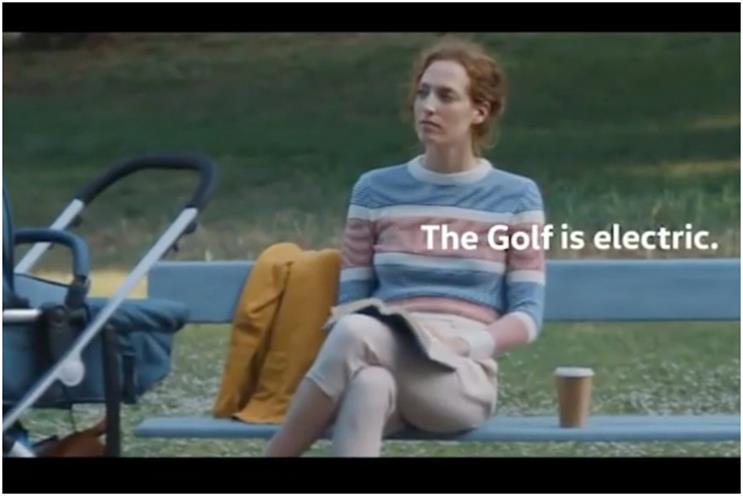
Mondelez International and Volkswagen have become the first companies to fall foul of new rules around harmful gender stereotyping in advertising, with ads from Philadelphia cheese and Volkswagen eGolf banned.
The Advertising Standards Authority (ASA) said a TV and video-on-demand ad for Philadelphia and a TV ad for Volkswagen eGolf breached the new rules, which came into force on the 14 June. Both ads were live on that same date.
The Philadelphia ad made by Ogilvy Paris depicted two new fathers in a restaurant by a conveyor belt serving buffet food. One man was shown carrying a child in his arms and the other in a car seat. As they talk, one man absentmindedly places his child on the moving conveyor belt. "Let's not tell mum," he says, having moved across the room to pick the baby up.
The Volkswagen spot features the strapline "when we adapt, we can achieve anything". It shows a couple going to bed in a tent having climbed a steep rockface, a man in space, and an athlete with a prosthetic running leg before panning on to a woman sitting quietly on a bench reading next to a baby's pram. It was created by DDB Europe and adapted by Adam & Eve/DDB for the UK market.
In breach of the code
Mondelez said the ad was intended to highlight the appeal of the product by showing a humorous situation in which parents found it so delicious they got momentarily distracted from looking after their children. But the ASA upheld the complaint, which challenged whether it was in breach of the code because it perpetuated "a harmful stereotype by suggesting that men were incapable of caring for children and would place them at risk as a result of their incompetence".
It also upheld three complaints against the Volkswagen ad, which challenged whether the ad perpetuated harmful gender stereotypes by showing men engaged in adventurous activities in contrast to a woman in a care-giving role. Volkswagen defended the ad and said it was centred on the ability of the human spirit to adapt to challenges and change brought about by circumstances. It said welcoming a newborn into the family was a life-changing experience that would be shared by many viewers, regardless of gender.
A Mondelez International spokesperson said: "We are extremely disappointed with the ASA decision. We take our advertising responsibility very seriously and work with a range of partners to make sure our marketing meets and complies with all UK regulation. This includes pre-approval from a recognised television advertising body, before any advert is aired to the public."
Implications for a 'wide range' of ads
A Volkswagen spokesperson defended itself as a responsible advertiser and said it was keen to work to the ASA's guidelines. Geraldine Ingham, head of marketing for Volkswagen UK, said: "As both a leader within this business and as a mother, I do not believe that the roles of the women in this advertisement are in any way portrayed negatively.
"Just like the men, they are shown taking part in challenging situations, such as in a tent perched on a mountainside and in a spacecraft, while another is shown to be embarking on what is surely life’s greatest and most valuable role – raising another human being."
A DDB spokesperson welcomed the ASA guidelines and added that while it is disappointed with the ruling, it accepts the role as advertisers "to ensure our work is free from any suggestion of gender sterotyping, and we will continue to make every effort to uphold these important new standards".
Clearcast, which approved the ads before they were aired, issued a statement also expressing its disappointment by the rulings and said the ASA's interpretation of the new guidance went "further than we had anticipated and has implications for a wide range of ads" and would use these rulings in assessing future ads where gender stereotypes might be considered harmful.
Buxton ad not upheld
A separate ad from Buxton was found by the ASA not to have breached the rules. It depicted a female ballet dancer, male drummer and male rower training hard to achieve but while the ASA acknowledged those talents were associated with the respective genders, it did not consider the ad to perpetuate harmful stereotypes.



.jpg)
.jpeg)
